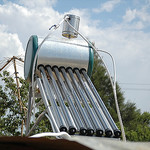<p style="text-align: justify">If you want to invest in an upgrade for your water heating system, whether to be more environmentally conscious or reap savings on your monthly bill, your main options are a heat pump and a solar-powered geyser.</p>
<p style="text-align: justify">If you’re confused as to which would suit you best, here are some factors to consider.</p>
<p><img class="alignright" alt="55 Litre Solar Geyser" src="http://farm1.staticflickr.com/100/274597712_6efdeb8479_q.jpg" width="150" height="150" /></p>
<h2><strong>First of all what’s what?</strong></h2>
<p style="text-align: justify">You’re probably familiar with the general concept of a solar geyser, even if you don’t know the technical ins and outs of how it works exactly. Suffice it to say that there’s a solar collector that generates heat from the sun, and a geyser that stores the heated water until needed.</p>
<p style="text-align: justify">A heat pump on the other hand might be less familiar to you. It basically works like a refrigerator, but in reverse, using a compressor to use heat from the surrounding air to heat water. It still uses electricity, but three to four times more efficiently than a conventional geyser does.</p>
<h2><strong>Location, location, location</strong></h2>
<p style="text-align: justify">Solar-powered geysers would obviously work best in areas that get a lot of sun. Although, they can supplement the hot water supply via conventional electrical heating methods if there isn’t enough sunlight for your household’s needs. A heat pump works well in high-humidity areas, like you’d find near the coastline, but not in very cold areas as it needs heat from the atmosphere to heat the water.</p>
<p><img class="alignright" alt="Heat pump" src="http://farm4.staticflickr.com/3651/3365272173_5565d5d0e2_q.jpg" width="150" height="150" /></p>
<h2><strong>How’s the water?</strong></h2>
<p style="text-align: justify">While solar geysers can operate efficiently no matter the quality of the water supply, heat pumps can be damaged by “hard water”, which is water with high levels of calcium carbonate.</p>
<p style="text-align: justify">The calcium carbonate can solidify and form sediment that blocks the heat exchanger. You can treat the water, but this complicates the matter and will raise the costs involved.</p>
<h2><strong>Architectural constraints</strong></h2>
<p style="text-align: justify">While a heat pump can be installed anywhere, with a solar geyser, you are more limited in where you can install it, as it works best if installed on a north-facing flat roof. Alternatively, you could have the panels on a roof and the geyser near the ceiling, but even this isn’t feasible for every household.</p>
<h2><strong>Installation and maintenance</strong></h2>
<p style="text-align: justify">Water pumps are relatively easy to install, but solar heaters are pricey and complicated to install. On the other hand, solar water heaters usually have longer lifespans and require less maintenance than heat pumps.</p>
<h2><strong>Other factors</strong></h2>
<p style="text-align: justify">Heat pumps can be somewhat noisy, so this might be an issue for some. If you’re in a large house where the heat pump can be situated further away from the most used living areas, or even outside, then it wouldn’t matter as much.</p>
<p style="text-align: justify">Another factor is when your household uses water the most. A solar geyser is at its most efficient when the sun is at its peak. But with a heat pump you can have efficiently heated water at any time of the day.</p>
<p style="text-align: justify">So as you can see, it’s not a clear cut matter of which option is best, because there are so many factors to consider. Ultimately which you should choose depends on your personal situation.</p>
<h5>Featured images:</h5>
<p><span class="license">License: Creative Commons</span></p>
<p><span class="source">image source</span></p>
<p><span class="license">License: Creative Commons</span> <span class="source">image source</span></p>
<p>Queenie Bates is a freelance writer with a particular interest in the sustainable energy sector. She’s excited at how sophisticated our energy usage system is getting, like how the smart grid is going to replace the conventional electricity grid more and more, which allows energy users to track and manage their energy usage via their computers and smart phones.</p>

A Heat Pump Or Solar Geyser?
